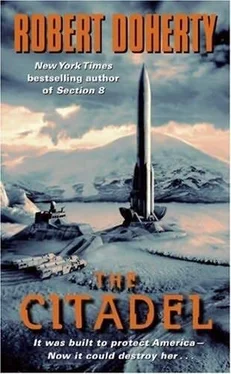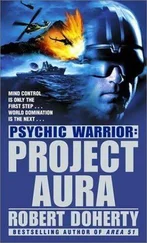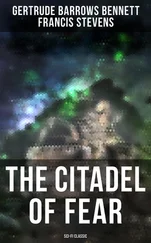He paused and looked at Tai, then Vaughn. When neither of them said anything, he continued. "What I've done is make a montage of the silhouettes of the mountains around the Citadel, along with the azimuths the pictures were taken at-I was fortunate that I was able to use the sun and shadows to judge that by. Then as we fly along the mountains, we try to match the outlines."
Vaughn was beginning to change his initial negative opinion of Logan. The man was obviously not stupid.
Logan held up a piece of paper with an outline of three jagged peaks poking above a sea of ice. "This is the view we should see along a due north azimuth. Mountains, whose peaks manage to make it above the ice, are called nunatuks down there. As you can see in this picture, we have these three very distinctive nunatuks, two large pointed ones on the flanks of this rounded one. This three mountain setup is what we should be looking for."
"How common are nunatuks?" Tai asked.
"Not as common as this map would make you believe with all these mountain ranges drawn on it," Logan replied. "The Antarctic ice sheet on the average is over twenty-five hundred meters thick. That's over eight-thousand feet. So a mountain has to be very high to clear the ice sheet.
"If we can find these three-and they are rather unique-and line them up exactly on azimuth, then we will be along the line that the Citadel lies on."
"This may be a stupid question," Vaughn said, "but wouldn't this place be totally covered up by now? After all these years, it would seem like there'd be quite a bit of snow on top."
"Good question." Logan rubbed his chin. "I think even the entrance and any air vents for the Citadel are most likely totally covered over by now, but not from snowfall. There isn't much accumulation down there, but the wind would pile ice and snow up against any exposed structure. However, I do have a plan for that.
"As I explained, we can get pretty close to its location if we find these mountains. Once we do that, we land and use sonar through the ice to try and find the base. It's similar to the way fishermen look for schools of fish. Earth First has two backpack sonar sets at the base that they use for research on the ice cap. The core tapping team didn't take them, so we can use those as we ski along the azimuth to shoot down into the ice. The metal and lack of density of the base ought to show up clearly. According to the information you sent, the Citadel covers a large area underground, so that should help quite a bit."
Vaughn wondered what contingency the builders had designed to find the place if it was covered up. He doubted very much that they had overlooked that major problem when they'd built it.
"What's the weather like?" Tai asked.
Logan walked over to a table and switched on a radio set. "Let's find out. We have high frequency contact with our base, and just last month we finally got the people over at McMurdo to give our station the most current weather reports. Before that we were on our own."
Vaughn thought it was interesting that McMurdo hadn't been giving the weather to the Earth First people. Typical government mentality. Earth First represented a potential threat, so the party line was probably to ignore them at least, or more likely, to make their life as miserable as possible. It was stupid, but who said governments were smart? On the other hand, he imagined that the Earth First people weren't exactly trying to ingratiate themselves with the various government personnel down there, and the resulting attitude was probably, "Why feed the dog that bites your hand?"
Logan fiddled with the dials and then picked up the microphone. "Earth First South, this is Auckland. Over." He clicked off and looked at them.
There was no answer, and he repeated the message. Finally the radio crackled with a woman's voice. "Auckland, this is Earth First Base. Over."
"What's the weather look like? Over."
"The latest from McMurdo at 1900 Greenwich mean, present readings: temperature minus twenty-nine degrees Fahrenheit. Winds north-northwest at twenty-three knots. Barometric pressure 29.4 rising. Ceiling 1,200 feet, overcast. Visibility four miles with some blowing snow.
"Forecast is for the temperature to rise to minus twenty-one degrees Fahrenheit and the winds to continue at the same. Ceiling is expected to go up to around 1,500 feet with continued broken clouds. Visibility to extend to almost five miles. Over."
Logan replied. "Great. We'll give you a call once we're in the air and tell you when to expect us. Over."
"Roger. See you then. Out."
Tai frowned. "That sounds like pretty bad weather to me."
Logan smiled. "Actually that's good weather for Antarctica. The forecast is for eight hours, plus two on the far side for a safety margin. That report is a combination of inputs from d'Urville, the Soviets at Minsk Station, the Aussies at Wilkes, and several others. McMurdo collates them and then broadcasts every thirty minutes. Four hours out from McMurdo is our point of no return. That's when we get the latest weather relayed from Aurora Glacier and the pilot makes our decision whether to continue on or turn around and head back based on weather and fuel."
Vaughn turned as someone came up behind them. Brothers stood there with two other men. One was an overweight man with a balding head, and the other an obvious weightlifter with muscles bulging under his overalls. His head was shaved, his black skin reflecting the overhead lights.
"Who is this?" Vaughn asked.
"Burke and Smithers," Logan said. "They're going with us as support."
"We don't need support," Vaughn said in a tone that brooked no argument.
Logan wasn't one, apparently, to accept that. "We aren't going onto the ice with only four people. We can't carry enough gear to survive. We have a standing policy-hell, everyone in Antarctica has a standing policy-of a minimum of five people in any surface party. And I assume sooner or later we're going to put boots down on the ice, right? And I vouch for them. They've done work for me when I've been contracted by Royce before."
Vaughn glanced at Tai, and she shook her head ever so slightly. He knew Logan was right-it helped to have extra bodies on hand-but for this mission he didn't trust anybody.
Brothers took the silence as a chance to step forward. He spoke with a strong Australian accent as he wiped off his hands with a grimy towel. "We're topped off, and I've got all your gear loaded. We'll be ready to roll at first light as long as the weather holds." He walked to the front of the room. "I've got extra fuel tanks on the wings and two bladders in the back all hooked up. We should have enough petrol to make it there."
"'Should have?'" Tai echoed.
Brothers smiled. "Just a phrase. It's a good airplane-a Cessna 411, if that means anything to you-but Antarctica is a bit out of its normal range so we have to pack on all that extra fuel. I assume Logan has told you about the point of no return. It's not only there because of weather, but also because of the fuel situation. Once we go past it, we've got to make it to Earth First South Station because we won't have enough fuel to turn around and come back." The burly man shrugged and dismissed the fuel situation.
"All right. Here's your safety briefing. If we run into trouble, you do what I say without asking any questions. We go down in the ocean, the raft is under the copilot's seat. That's the one up front that I'm not sitting in. You'd better hope we stay afloat long enough to get the raft inflated and out the window because if you get dunked, the cold water will kill you in less than a minute.
"We go down on land and I don't make it to give you advice, then my advice now is stay with the plane. It's got an emergency transponder on board, and even if that gets busted, the plane is going to be the biggest thing rescuers could find. You go wandering around on the ice, you'll last a little longer than if you had hit the water, but not by much. The end result will be the same.
Читать дальше











